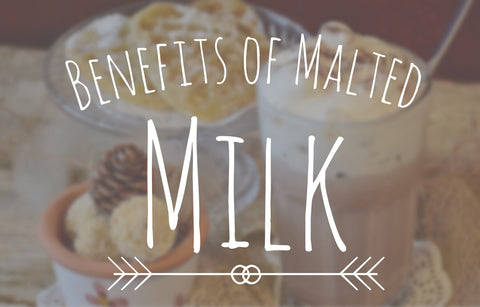Malted milk drinks are nowhere near as popular as tea or coffee and seem to be becoming less and less popular with younger generations shunning them in favour of other beverages. But are those youngsters doing this age-old drink a disservice, and are they missing out on a host of potential health benefits?
Malted milk drinks were once marketed as health drinks, and many older consumers still consider them to be a healthy alternative to coffee and tea. In this guide, we’ll see how much of that is true as we ask, “Are malted milk drinks good for you?”

What is Malted Milk?
Malted milk is often sold in powdered form, with the consumer then mixing it with hot milk/water. It is a creamy, sweet beverage made from fortified wheat flour, malted barley, and milk powder, to which sugar and flavourings are added.
A London-born pharmacist by the name of James Horlick first sold this concoction in the late 1800s, marketing it as nutritional supplement for infants. He was living in the United States at the time, and that is where the product was first made and sold, eventually becoming popular in ice cream parlours known as “Soda Shops” or “Malt Shops”. In the early 1900s, James Horlick returned to the United Kingdom and built the eponymous brand (Horlicks) we know today.
Is Malted Milk Good For You?
This is a very subjective question, and there are a few different answers as a result. It’s not good for you in the same way that broccoli is, and it doesn’t possess the same nutrients found in fruit or the same antioxidants found in green tea. But there are some nutrients in malted milk, and as a result, it can be considered healthy to a degree (there are some issues, though, which we will discuss further below).
The nutritional profile of malted milk can differ depending on the brand and product, but let’s use the UK’s biggest selling brands as an example. They average 70 to 80 calories per serving, and in that serving they provide around half your daily needs of vitamins A and C, and nearly all of your vitamin D requirements, as well as smaller amounts of iron and a host of other minerals.
If you mix these malted milk powders with semi-skimmed milk, as many do, then you’re also getting around a fifth of your daily protein needs in addition to a healthy dose of calcium and plenty of B vitamins. But many of these come from the milk, not the powder.
The Downsides
In years gone by, something that contained a wealth of vitamins and minerals could easily be passed off as a “healthy” product. These days, the average consumer is a little more aware and regulations are much stricter, leading many to consider malted milk products to be no healthier than hot chocolate.
In many ways, malted milk drinks are similar to cereal in that they are high in sugar but have been fortified with vitamins and minerals, which means the nutrients are added during the manufacturing stage as opposed to being found in their natural form. A single serving of the UK’s most popular malted milk drink, when consumed with semi-skimmed milk, contains just over 4 grams of fat, which is very low, and just under 21 grams of sugar, which is very high.
A single cup will provide you with nearly a quarter of your daily requirements of sugar, in addition to around 10% of saturated fat and salt. If you look at it that way, it doesn’t come across as very healthy at all. But there are some potential benefits to consuming malted milk . . .
The Benefits of Malted Milk

Malted milk may not be a nutritional powerhouse, but it has its uses when consumed occasionally as part of a healthy diet.
It Could Help You Sleep
Malted milk drinks used to be marketed as sleep aids, and while modern marketing tends not to revolve around their insomnia-fighting properties, the average consumer still associates them with relaxing at night. They won’t knock you out like a sleeping tablet would or have the sedating effect that camomile has (not to mention herbs like valerian), but they could help you sleep as part of a relaxing nightly ritual.
A hot drink triggers a change in body temperature in much the same way that a hot bath or shower does, and the hot milk may also have the same effect. Of course, there are malted milk drinks that also contain caffeine, and this will have the opposite effect, but if the dose is low and you have a high tolerance, then it may still work.
Just don’t expect miracles, and make sure you have a solid nightly ritual (no phone/TV or work) to give it every chance of working.
It Can Give You Some Much-Needed Vitamins
The average consumer will not benefit from consuming additional nutrients like vitamin C and B vitamins. These are abundant in food, and there is simply no benefit to mega-dosing with them, contrary to what those cold & flu adverts would have you believe. Research conducted in the UK has discovered that very few consumers, regardless of age or diet, are actually deficient in key nutrients.
But there is one big exception: vitamin D. This vitamin is produced during exposure to direct sunlight, and thanks to the UK climate—as well as the fact that we’re spending more time indoors and using heaps of sunscreen during the summer—we’re simply not getting enough of it.
Vitamin D supplementation is also rare, with many consumers instead opting for vitamin C, B vitamins, and other overused nutrients. All of this makes certain malted milk drinks very useful for a huge number of UK consumers. A single cup on an evening could provide you with your daily dose of this vitamin, which in turn could protect you against a host of diseases. Of course, the best way to get vitamin D is to get your share of sunshine, but that’s often easier said than done.
A Potentially Healthy Treat
If you enjoy an occasional cup of hot chocolate, then swapping your favourite chocolatey treat for a malted milk drink could be a smart move. You’ll probably be consuming less sugar and fat (depending on the brand of hot chocolate versus malted milk), and you’ll also be getting some additional nutrients without sacrificing this occasional treat. The high concentration of sugar may not be ideal for regular consumption, but just like the creamy and sweet bubble tea, it makes for a delicious way to treat yourself every now and then.

